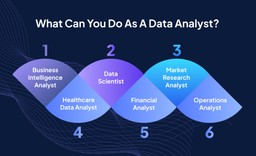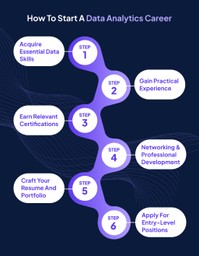Hey there, future data whizzes!
Did you know that the global big data analytics market will explode, with a whopping compound annual growth rate of almost 30 percent in the coming years?
That’s right! In today’s world, where data rules the roost, becoming a data analyst opens up many exciting opportunities.
But where do you even begin, right?
Don’t worry; we’ve got your back!
This guide is your reliable companion on the journey from a data analytics newbie to a seasoned pro.
We’ll guide you through each step, from mastering the basics to reaching new heights in your data analytics jobs.
Talking about guidance, getting the proper education is crucial in launching your data analytics career.
A quality data analytics course can significantly improve your chances of landing several data analytics jobs and having a choice and options. You will gain crucial skills and knowledge and demonstrate to employers that you’re serious about pursuing a career in data analytics.
So, buckle up and get ready to dive into the fantastic world of data analytics. Let’s see how to get a job in data analytics.
Is a Data Analytics Career Right for You?
Did you know the global big data market is forecasted to grow to 103 billion U.S. dollars by 2027?
With such tremendous growth on the horizon, now is the time to consider a career in data analytics.
Let’s explore why pursuing a career in data analytics can be a smart move:
High Demand
Data is everywhere, and companies are hungry for professionals who can understand it all. With the explosive growth of data across industries, the demand for skilled data analysts is at an all-time high. This means plenty of data analytics job opportunities and security for those with the right skills.
Lucrative Salaries
Data analytics is one of the most lucrative fields.
According to Glassdoor, data analysts with 0-1 year of experience earn about 60K per year.
Companies are willing to pay top dollar for talented analysts who can help them leverage data to make informed decisions, and data analytics jobs often come with very attractive salaries and benefits packages.
Diverse Opportunities
Data analytics jobs are being more and more frequently opened in almost every industry and sector. Data analysis skills are in demand, from healthcare and finance to retail and entertainment.
This means you’ll be flexible to pursue industry opportunities that align with your interests and passions.
Continuous Learning
Data analytics constantly evolves, with new tools, technologies, and techniques continually emerging. This means you’ll always continue learning and growing in your career.
Whether it’s mastering a new programming language or staying updated on the latest data analysis methods, there’s always something new to explore.
Impactful Work
Data analytics isn’t just about crunching numbers; it’s about making a real impact.
By uncovering valuable insights from data, data analysts help businesses make smarter decisions, improve processes, and drive innovation.
Knowing that your work is making a tangible difference can be incredibly rewarding.
Is Data Analytics Hard?
It’s a question many aspiring data analysts grapple with.
Let’s dive into the realities of the field:
Complexity of Data
Data analytics can be challenging due to the complexity of the data involved. Data sets can be massive, messy, and disparate, requiring data analysts to possess strong data analytics skills and the ability to wrangle and clean data effectively.
Technical Skills
Data analytics involves working with various tools and technologies, such as programming languages (e.g., Python, R), databases (e.g., SQL), and data visualization tools (e.g., Tableau). While mastering these technical skills may seem daunting, they can be learned over time with dedication and practice.
Continuous Learning
The data analytics field constantly evolves, with new tools, techniques, and technologies emerging regularly. Data analysts must stay updated on the latest trends and developments, which requires a commitment to continuous learning and professional development.
Problem-Solving
Data analytics is fundamentally about solving problems and extracting actionable insights from data. This requires critical thinking, creativity, and the ability to approach problems differently. While challenging, solving complex problems can also be intellectually stimulating and rewarding.
Soft Skills
Besides technical skills, data analysts also need strong communication, collaboration, and problem-solving skills. They must communicate their findings to non-technical stakeholders and collaborate with team members across different departments.
While data analytics can be challenging, it’s important to remember that it’s also a gratifying profession.
The satisfaction of uncovering valuable insights from data, making data-driven decisions, and seeing the impact of your work can make the challenges worthwhile.
Anyone can succeed in data analytics with dedication, perseverance, and a passion for data.
So, if you’re up for the challenge, data analytics might be the perfect profession for you!
Is College
Worth It Anymore?
Exploring Career Paths: What Can You Do as a Data Analyst?
As a data analyst, your skills are in high demand across various industries.
Let’s take a look at some of the exciting career options available to data analysts:
Business Intelligence Analyst
In this role, you’ll analyze complex data sets to identify specific trends, patterns, and insights that inform business decisions. Business intelligence analysts work closely with stakeholders to provide data-driven recommendations and drive strategic initiatives.
Data Scientist
Data scientists go beyond traditional data analysis to develop predictive models, machine learning algorithms, and data-driven solutions to complex business problems. They work with large volumes of data to uncover actionable insights and drive organizational innovation.
Market Research Analyst
Market research analysts collect and analyze data on market trends, consumer behavior, and competitive landscapes to help businesses make informed decisions about product development, marketing strategies, and market positioning. They use various research methods and analytical techniques to gather and interpret data.
Healthcare Data Analyst
Data analysts are crucial in analyzing patient data, medical records, and healthcare trends in the healthcare industry to improve patient outcomes, optimize healthcare delivery, and reduce costs. They work with healthcare providers, insurance companies, and government agencies to leverage data for better decision-making.
Financial Analyst
Financial analysts analyze financial data, market trends, and investment opportunities to help businesses and individuals make informed financial decisions. They evaluate financial performance, assess risk, and forecast future financial trends using statistical models and analytical tools.
Operations Analyst
Operations analysts optimize business processes, improve efficiency, and reduce organizational costs. They analyze operational data to identify areas for improvement, implement process improvements, and measure the impact of changes on business performance.
These are just a few examples of the diverse career paths available to data analysts. Whether you’re interested in business, healthcare, finance, or another industry, the data analyst skills you develop are highly transferable and in demand!
Essential Tools for Aspiring Data Analysts: Your Starter Kit for Success
As a new data analyst, familiarizing yourself with the right tools is essential for mastering the craft and making meaningful contributions in the field.
Here’s a breakdown of some of the best tools to kickstart your journey:
Programming Languages
- Python: Widely regarded as the go-to language for data analysis, Python offers a vast ecosystem of libraries and frameworks like Pandas, NumPy, and Matplotlib, making it ideal for data manipulation, analysis, and visualization.
- R: Another popular choice among data analysts, R is well-suited for statistical analysis, data visualization, and machine learning tasks. Its extensive library of packages, such as dplyr and ggplot2, provides powerful tools for data exploration and modeling.
Database Management Systems (DBMS)
- SQL: SQL (Structured Query Language) is a must-know for data analysts, as it’s used to interact with relational database management systems (RDBMS) such as MySQL, PostgreSQL, and SQLite. Knowing SQL enables you to query databases, retrieve and manipulate data, and perform essential data analysis tasks.
Data Visualization Tools
- Tableau: It’s a powerful data visualization tool that lets you create interactive dashboards, charts, and graphs without extensive coding. Its simple drag-and-drop interface makes it accessible to beginners while offering advanced features for seasoned analysts.
- Power BI: Developed by Microsoft, Power BI is another popular choice for data visualization and business intelligence. With its user-friendly interface and seamless integration with other Microsoft products, Power BI enables you to create insightful visualizations and share reports with stakeholders easily.
Statistical Analysis Tools
- Excel: While not explicitly designed for data analysis, Excel remains a versatile and widely used tool for fundamental statistical analysis, data manipulation, and visualization. Its familiarity and ease of use make it a valuable tool for beginners to practice data analysis concepts.
- Jupyter Notebooks: Jupyter Notebooks is an open-source web application that lets you create and share documents containing live code, equations, visualizations, and narrative text. It’s an excellent tool for exploring data, documenting your analysis process, and collaborating with others.
Version Control Systems
- Git: Git is essential for managing and tracking changes to your code and analysis projects. Learning Git and using platforms like GitHub or GitLab allows you to collaborate with teammates, maintain version history, and track project progress effectively.
By familiarizing yourself with these essential tools and investing time in learning and practicing with them, you’ll be well-equipped to embark on your journey as a data analyst and confidently tackle real-world data challenges.
Your Guide to Thriving in Tech Trends & Careers
How to Start a Data Analytics Career
Are you eager to launch a career in data analytics but unsure where to begin?
Let’s break down the steps to kickstart your journey:
Acquire Essential Data Skills
Start by building a solid foundation in critical skills required for data analytics. This includes proficiency in programming languages such as Python or R, an understanding of database management systems such as SQL, and familiarity with data visualization tools like Tableau or Power BI.
Online data analysis courses, tutorials, and self-paced learning platforms are great resources to acquire these skills.
Gain Practical Experience
Hands-on experience is invaluable in the field of data analytics. Look for opportunities to work on real-world projects through internships, freelance gigs, or personal projects.
Participating in hackathons, data science competitions, or open-source projects can also provide valuable practical experience and help you build a solid portfolio of work to showcase to potential employers.
Earn Relevant Certifications
Consider pursuing data certifications that validate your skills and expertise in data analytics. Certifications from reputable organizations like Microsoft, IBM, or Google can enhance your credibility and demonstrate your commitment to professional development.
Look for certifications aligning with your career goals and the specific tools or technologies you want to specialize in.
Networking and Professional Development
Networking is essential for building connections in the professional community and discovering data analytics jobs. Attend industry events, conferences, meetups, and networking events to connect with data professionals in the field.
Join online forums, LinkedIn groups, and social media communities to stay updated on industry trends, share knowledge, and engage with like-minded individuals.
Craft Your Resume and Portfolio
As you gain skills and experience, tailor your resume and portfolio to highlight your achievements during your previous data analytics jobs and demonstrate your expertise in data analytics.
Showcase projects you’ve worked on, certifications you’ve earned, and any relevant experience or achievements that set you apart from other candidates. Customizing your resume and portfolio for each job application can help you stand out to potential employers.
Apply for Entry-Level Positions
Once you feel confident in your skills and experience, start applying for entry-level positions in data analytics. Look for data analytics jobs at companies that align with your interests and career goals.
Don’t be discouraged by rejection; keep refining your skills, gaining experience, and applying for opportunities that match your qualifications and aspirations.
By following these steps and staying committed to continuous learning and professional development, you can embark on a successful career journey in data analytics.
Remember, every step you take brings you closer to achieving your goals and realizing your potential in this dynamic and rewarding field.
Career Transition Toolkit
Propel Your Data Analytics Career with Syntax Technologies
As a successful data analyst, you’ll have the opportunity to make a real impact by uncovering valuable insights and driving informed decision-making.
With the demand for skilled professionals on the rise, the potential for growth and advancement in this field is limitless.
In data analytics, having the right skills can unlock exciting career opportunities.
That’s where Syntax Technologies comes in!
With our professional course, we’re here to help you master essential tools like Python, R, SQL, and data visualization.
Our friendly experts provide hands-on training and personalized support, empowering you to kickstart a successful career in data analytics.
Enroll now, and together at Syntax Technologies, let’s make your career dreams a reality!




